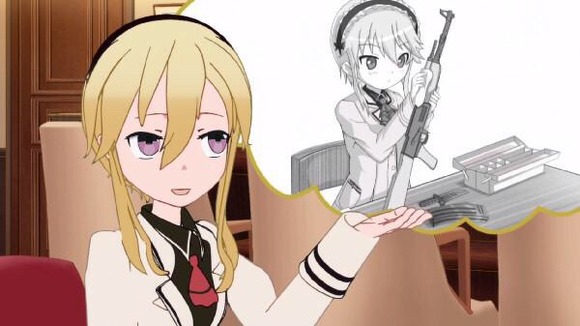a.k.a. Tesagure! Season 3
Director: Kōtarō Ishidate
Screenplay: Kōtarō Ishidate
Cast: Asuka Nishi as Yua Suzuki,
Ayaka Ohashi as Koharu Tanaka, Karin Ogino as Aoi Takahashi, Mikako Komatsu as
Hina Usami, Natsumi Takamori as Yui Enjoji, Reina Ueda as Mobuko Sonota, Rumi
Okubo as Kanon Izayoi, Satomi Akesaka as Hina Satō, Shiori Mikami as Rin
Arisugawa, Sumire Uesaka as Tomomi Okonogi, Kaoru Mizuhara as Mio Watanabe
Viewed in Japanese with English Subtitles
The Tesagure train finishes, and with a considerable risk in how it
jumps up from fifteen minute episodes to full length ones. The other change is
that Tesagure is invaded by an
entirely different series, in this case bringing in the case of a manga series
called Minarai Megami Puru Purun Sharumu,
revolving around five personalities part of the radio program A&G NEXT
GENERATION Lady Go!!. Effectively a spin-off than a third series, these new
characters are only really defined as being five high school girls meant to
train as cosmic goddesses, a detail which is quickly dismissed in favour of
them joining in on long absurd discussions.
Whatever the case the length was
necessary, as the show through the character Yua Suzuki, who now for most of
the episodes speaks to the audience and her cast members in the openings of the
show, is now openly as much a way to promote the characters in-between them
organising what to do for each episode. They shuffle the cast members, or have
full group events, but it's usually the Puru
Purun Sharumu cast first, than the original Tesagure cast. Tragically the Mobuko family, the insanely numerous
identical sisters, get put by the wayside as there's not a lot of activities
anymore baring a couple. Thankfully, voice actresses Reina Ueda got the end of episode previews, which tell a strange Mobuko
family tale rather than preview the main show, as compensation.
The show is mainly conversations
now for Season 3 and continuing improvisation with the voice actresses, more
about the casts coming up with new and wacky takes on ideas like zoos to
dentists. Some of the more focused and sillier jokes, like a card game of
constructing sentences which lead to incompetent zookeepers who still have jobs
or having to complete a mathematic test as you get your teeth done, are
legitimately funny. When the voice cast break character, or find the work funny
in character, is when Tesagure
succeeds.
Unfortunately stretching this
premise to over twenty minutes per episode is with huge pacing issues, creator Kōtarō Ishidate's obsession with
improvised dialogue one which cannot be extended this long without respite. The
activities from the two series before sadly don't appear frequently as
mentioned which causes a problem, a sense of malaise felt as cast are just sat
around chairs for the most part, never necessarily building to a great deal as,
whilst the original Tesagure
characters have established personalities, the Puru Purun Sharumu cast don't stand out except in rare occasions.
Examples like this, occasional, are such as one voice actress breaking
character to explain to another heavy metal or a Russian speaking girl who has
access to a tank but is tragically not as frequently used as possible, possibly
in a fourth wall breaking joke due to her actress having scheduling conflicts.
When the activities do appear,
like a musical theatre version of the show or ping pong with intimate questions
needing to be answered as you strike the ball back over the net, its
appreciated. Thankfully the production gets a much needed shot in the arm when
it was decided to send the original Tesagure
actresses off to real life locations, like a haunted house or a zoo, record the
real exchanges and scenic sounds as they try to "stay in character"
and animating the results. This does really stretch what is required of the cast
to a virtue, also really getting into some unexpected things rarely found in
anime, such as the one recorded on a Ferris wheel where unless she's acting Satomi
Akesaka as Hina really doesn't like heights and shows it in that escapade. Also
its sweet just to hear voice actors get easily amused by meerkats, even if the
critters animated are caught about to get it on in the open.
Unfortunately, the attempts at
new ideas do lead to two bad episodes, the two part "Yuriwolf" game. Ishidate likes having his casts playing
games, felt when a later show Himote
House (2018) ends with an intentional whimper of a card game for the last
sequence. The game here is "Werewolf", in which two people have are
assigned as werewolves and in trials the group have to try to vote out them to
win, with the later picking off a person after each trial if not voted off and
deceiving everyone else1. Changing it to "yuriwolf", in
reference to "yuri" (lesbian or gay female) stories, has an
unfortunate connotation someone didn't think too carefully of, though Ishidate to his credit with Himote House had the "Yuri Game of
Life" episode, an episode that has stuck with me in a flawed series which
was probably as biting about the problematic LGBT politics in Japan as you
could get away with and then some. It doesn't excuse the Yuriwolf episodes,
actually called Let's play with
werewolves and yuri ((1) and (2)), being frightfully boring, painfully so as the two episodes drag. What
makes it worse as, showing clips of another bonus game, the final episode tells
use this can only be found on the Blu-Rays as extras, suddenly turning this
series in an advertisement for material we cannot get in the West for added
insult to injury.
The question of whether the entire
three seasons of Tesagure ultimately
works is a complicated one. Everyone clearly had fun, managing to get away with
a clip show that's good at one point by having it redubbed, the cast sorted by
categories as esoteric as who accidentally called their teacher
"mother" for rounds where some may have to say everything in the
verge of sexual arousal to shouting from outside the recording booth. With the
original cast too, they have grown these characters into idiosyncratic figures
over time. Or there's the further existential adventures of Karin Ogino, as the boisterous Aoi, who
eventually becomes more puerile, biting and bored as she continues onwards
baring her continued obsession with making all her jokes puns, culminating in
the final episode where she's meant to play her character in a comedy
competition against everyone only for baffled amusement at what mood she is in
to take place.
I will be blunt though in saying,
if taken as a whole, the franchise doesn't succeed. Mainly this is because
fifteen minute micro episodes are bite sized but as a whole, there's not as
many successes as there should be even if the cast are admirable in
personality. There is a lot of experimentation here which does indulge without
enough risk or pay off, to which I will always go back to gdgd Fairies (2011/2013) which Ishidate
worked on for the first season. That series did stand out for the improvised
sequences but was both focused on one idea with rich potential (the magical
"dubbing lake" of 3D models taken off the internet crudely animated),
and also had many other segments which were great and became some of the
funniest material by the season.
There's also not a lot of growth
in Season 3 here, as baring the much welcomed sequences at public attractions
the only aspects which succeed are the jokes that lasted ("worn
panties" a reoccurring gag since season one that clearly caught on) or
characters who have been able to evolving a little over time, such as the initial
"protagonist" Koharu now the put upon and sympathetic butt of a lot
of jokes. Neither most of the manga and anime references, nor many of the
conversations in themselves, beyond this stand out. It is a surprise for me
that the series got three seasons, as it's really peculiar. The likelihood is
that, as I have found, there's developed a taste in these type of simple shows
about esoteric con esoteric conversations and jokes which usually rely on puns
more fluid in Japanese, but even then this franchise's a real curiosity in its
longevity.
Arguably, as animation, it's
always skirted on the seat of its (worn) pants by being very basic and
improvised. Even in spite of how easily it must've been to produce, which is a
thing to consider as the show is constantly joking in season three in some of
the better jokes that the production is behind, even early on recycling
sequences from before for jarring results. Even then, I look to the strange experience
that was Virtual-SAN Looking (2019),
a show I missed most of the humour of but still liked, as a show which sold
itself on the hot trend of virtual YouTubbers and thus becoming a fascinating
sociological piece in the making. Tesagure
in contrast ebbed into something I am glad to have completed the whole of but
may sadly disappear entirely from memory barring few highlights. Even in terms
of Kōtarō Ishidate's career, which I
want to continue and find as much of in interest of his very unique style, the
good moments through two (and a spin-off's) worth of a franchise don't
necessarily hit as high moments as other projects I've seen of his.
=======
1) According to history, it's
been traced back to 1986 to a Russian named Dimitry
Davidoff as a social deduction game originally called Mafia, befittingly with the Russian speaking character here the one
that plays the hostess/narrator.



No comments:
Post a Comment